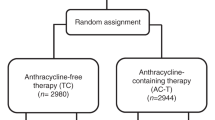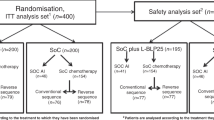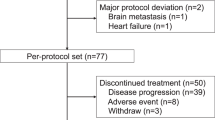Abstract
Background
We have previously demonstrated S-1 is non-inferior to taxane with respect to overall survival as first-line chemotherapy for HER2-negative metastatic breast cancer. We aimed to confirm whether S-1 is also non-inferior to anthracycline-containing regimens in the same setting.
Methods
We conducted an open-label, non-inferiority, Phase 3 study. Individuals who had HER2-negative metastatic breast cancer, had received no chemotherapy for advanced disease and had endocrine therapy resistance, were randomly assigned to the anthracycline-containing regimens or S-1. The primary endpoint was overall survival. A pre-planned combined analysis of our two Phase 3 studies was also carried out.
Results
We enrolled 230 patients (anthracycline, n = 115; S-1, n = 115). Median overall survival was 30.1 months (95% CI 24.9–35.8) with the S-1 group and 33.7 months (95% CI 25.5–36.9) with the anthracycline group. The HR for the anthracycline group was 1.09 (95% CI 0.80–1.48). The combined analysis constituted 814 patients (395 assigned to standard treatment (anthracycline or taxane); 419 assigned to S-1). Median overall survival was 36.3 months in the standard treatment group and 32.7 months in the S-1 group. S-1 was non-inferior to standard treatment in terms of overall survival (HR 1.06 (95% CI 0.90–1.25); P non-inferiority = 0.0062).
Conclusions
S-1 could be considered a new treatment option for first-line chemotherapy for patients with HER2-negative metastatic breast cancer.
Clinical trial registration
The University Hospital Medical Information Network, Japan: UMIN000005449. This trial was registered on 15 April, 2011.
This is a preview of subscription content, access via your institution
Access options
Subscribe to this journal
Receive 24 print issues and online access
$259.00 per year
only $10.79 per issue
Buy this article
- Purchase on Springer Link
- Instant access to full article PDF
Prices may be subject to local taxes which are calculated during checkout




Similar content being viewed by others
Data availability
All datasets used and analysed during this study are available from the corresponding author on reasonable request.
References
Cardoso F, Senkus E, Costa A, Papadopoulos E, Aapro M, André F, et al. 4th ESO-ESMO International Consensus Guidelines for Advanced Breast Cancer (ABC 4)dagger. Ann Oncol. 2018;29:1634–57.
Sparreboom A, de Jonge MJ, Verweij J. The use of oral cytotoxic and cytostatic drugs in cancer treatment. Eur J Cancer. 2002;38:18–22.
Shirasaka T, Nakano K, Takechi T, Satake H, Uchida J, Fujioka A, et al. Antitumor activity of 1 M tegafur-0.4 M 5-chloro-2,4-dihydroxypyridine-1 M potassium oxonate (S-1) against human colon carcinoma orthotopically implanted into nude rats. Cancer Res. 1996;56:2602–6.
Takashima T, Mukai H, Hara F, Matsubara N, Saito T, Takano T, et al. Taxanes versus S-1 as the first-line chemotherapy for metastatic breast cancer (SELECT BC): an open-label, non-inferiority, randomised phase 3 trial. Lancet Oncol. 2016;17:90–98.
Aaronson NK, Ahmedzai S, Bergman B, Bullinger M, Cull A, Duez NJ, et al. The European Organization for Research and Treatment of Cancer QLQ-C30: a quality-of-life instrument for use in international clinical trials in oncology. J Natl Cancer Inst. 1993;85:365–76.
Kobayashi K, Takeda F, Teramukai S, Gotoh I, Sakai H, Yoneda S, et al. A cross-validation of the European Organization for Research and Treatment of Cancer QLQ-C30 (EORTC QLQ-C30) for Japanese with lung cancer. Eur J Cancer. 1998;34:810–5.
EuroQol Group. EuroQol-a new facility for the measurement of health-related quality of life. Health Policy. 1990;16:199–208.
Tsuchiya A, Ikeda S, Ikegami N, Nishimura S, Sakai I, Fukuda T, et al. Estimating an EQ-5D population value set: the case of Japan. Health Econ. 2002;11:341–53.
Lang I, Brodowicz T, Ryvo L, Kahan Z, Greil R, Beslija S, et al. Bevacizumab plus paclitaxel versus bevacizumab plus capecitabine as first-line treatment for HER2-negative metastatic breast cancer: interim efficacy results of the randomised, open-label, non-inferiority, phase 3 TURANDOT trial. Lancet Oncol. 2013;14:125–33.
Zielinski C, Lang I, Inbar M, Kahán Z, Greil R, Beslija S, et al. Bevacizumab plus paclitaxel versus bevacizumab plus capecitabine as first-line treatment for HER2-negative metastatic breast cancer (TURANDOT): primary endpoint results of a randomised, open-label, non-inferiority, phase 3 trial. Lancet Oncol. 2016;17:1230–9.
Welt A, Marschner N, Lerchenmueller C, Decker T, Steffens CC, Koehler A, et al. Capecitabine and bevacizumab with or without vinorelbine in first-line treatment of HER2/neu-negative metastatic or locally advanced breast cancer: final efficacy and safety data of the randomised, open-label superiority phase 3 CARIN trial. Breast Cancer Res Treat. 2016;156:97–107.
Rochlitz C, Bigler M, von Moos R, Bernhard J, Matter-Walstra K, Wicki A, et al. SAKK 24/09: safety and tolerability of bevacizumab plus paclitaxel vs. bevacizumab plus metronomic cyclophosphamide and capecitabine as first-line therapy in patients with HER2-negative advanced stage breast cancer—a multicenter, randomized phase III trial. BMC Cancer. 2016;16:780.
Cinieri S, Chan A, Altundag K, Vandebroek A, Tubiana-Mathieu N, Barnadas A, et al. Final results of the randomized phase II NorCap-CA223 trial comparing first-line all-oral versus taxane-based chemotherapy for HER2-negative metastatic breast cancer. Clin Breast Cancer. 2017;17:91–99. e1
Wang J, Xu B, Yuan P, Ma F, Li Q, Zhang P, et al. Capecitabine combined with docetaxel versus vinorelbine followed by capecitabine maintenance medication for first-line treatment of patients with advanced breast cancer: phase 3 randomized trial. Cancer. 2015;121:3412–21.
Partridge AH, Rumble RB, Carey LA, Come SE, Davidson NE, Leo AD, et al. Chemotherapy and targeted therapy for women with human epidermal growth factor receptor 2–negative (or unknown) advanced breast cancer: American Society of Clinical Oncology Clinical Practice Guideline. J Clin Oncol. 2014;32:3307–29.
Shimoi T, Nagai S, Yoshinami T, Takahashi M, Arioka H, Ishihara M, et al. The Japanese Breast Cancer Society Clinical Practice Guidelines for systemic treatment of breast cancer, 2018 edition. Breast Cancer. 2020;27:322–31.
Talbot DC, Moiseyenko V, Van Belle S, O’Reilly SM, Alba Conejo E, Ackland S, et al. Randomised, phase II trial comparing oral capecitabine (Xeloda) with paclitaxel in patients with metastatic/advanced breast cancer pretreated with anthracyclines. Br J Cancer. 2002;86:1367–72.
Stockler MR, Harvey VJ, Francis PA, Byrne MJ, Ackland SP, Fitzharris B, et al. Capecitabine versus classical cyclophosphamide, methotrexate, and fluorouracil as first-line chemotherapy for advanced breast cancer. J Clin Oncol. 2011;29:4498–504.
Oshaughnessy JA, Blum J, Moiseyenko V, Jones SE, Miles D, Bell D, et al. Randomized, open-label, phase II trial of oral capecitabine (Xeloda) vs. a reference arm of intravenous CMF (cyclophosphamide, methotrexate and 5-fluorouracil) as first-line therapy for advanced/metastatic breast cancer. Ann Oncol. 2001;12:1247–54.
Saad ED, Buyse M. Non-inferiority trials in breast and non-small cell lung cancer: choice of non-inferiority margins and other statistical aspects. Acta Oncol. 2012;51:890–6.
Yamamoto D, Iwase S, Tsubota Y, Ariyoshi K, Kawaguchi T, Miyaji T, et al. Randomized study of orally administered fluorinated pyrimidines (capecitabine versus S-1) in women with metastatic or recurrent breast cancer: Japan Breast Cancer Research Network 05 Trial. Cancer Chemother Pharm. 2015;75:1183–9.
Acknowledgements
We thank all the patients, their families and the investigators who participated in this study.
Funding
This study was sponsored by the Comprehensive Support Project for Oncology Research (CSPOR) of the Public Health Research Foundation. The research fund was provided to CSPOR by Taiho Pharmaceutical Company Limited under the study contract. Taiho Pharmaceutical took no part in this study other than providing information relevant to the proper use of the study drug.
Author information
Authors and Affiliations
Contributions
HM contributed to the design of the study. HM, YU, TW, YS, RN, TT and YH were members of the executive committee that oversaw the conduct of the study. HM, HA, TW, YP, MT, YS, RN, TT, TF and YH contributed substantially to patient recruitment. HM and YU contributed to data collection. HM contributed to data review. YU and TK contributed to data analysis. All authors contributed to data interpretation. HM contributed to the writing of the report. All authors contributed to review of the report and approved the final submitted version.
Corresponding author
Ethics declarations
Ethics approval and consent to participate
The studies were done in accordance with the Ethical Guidelines for Clinical Research of the Japanese Ministry of Health, Labor and Welfare, and the Declaration of Helsinki. All participants gave written informed consent. An independent ethics committee for each participating site approved the protocol and any modifications. A full list of the ethical committees can be found in the Supplementary Information.
Consent to publish
Not applicable.
Competing interests
HM has received personal fees from Daiichi Sankyo, Taiho, and Takeda; funding from the Japanese government, Pfizer, and Daiichi Sankyo, outside the submitted work. MT has received personal fees from Taiho, Eisai, Pfizer, Astra Zeneca, Kyowa Kirin, Nippon Kayaku and Eli Lilly. TT has received personal fees from Taiho, Chugai Kyowa Hakko Kirin, Eisai, Pfizer, Novartis, Astra Zeneca and Takeda, outside the submitted work. The remaining authors declare no competing interests.
Additional information
Publisher’s note Springer Nature remains neutral with regard to jurisdictional claims in published maps and institutional affiliations.
Supplementary information
Rights and permissions
About this article
Cite this article
Mukai, H., Uemura, Y., Akabane, H. et al. Anthracycline-containing regimens or taxane versus S-1 as first-line chemotherapy for metastatic breast cancer. Br J Cancer 125, 1217–1225 (2021). https://doi.org/10.1038/s41416-021-01531-6
Received:
Revised:
Accepted:
Published:
Issue Date:
DOI: https://doi.org/10.1038/s41416-021-01531-6
This article is cited by
-
The Japanese Breast Cancer Society Clinical Practice Guidelines for systemic treatment of breast cancer, 2022 edition
Breast Cancer (2023)
-
Association of change in health-related quality of life and treatment discontinuation in metastatic breast cancer: a post hoc, exploratory analysis of two randomized clinical trials
Supportive Care in Cancer (2022)
-
Minimal important differences of EORTC QLQ-C30 for metastatic breast cancer patients: Results from a randomized clinical trial
Quality of Life Research (2022)
-
Effectiveness of eribulin as first-line or second-line chemotherapy for HER2-negative hormone-resistant advanced or metastatic breast cancer: findings from the multi-institutional, prospective, observational KBCRN A001: E-SPEC study
Breast Cancer (2022)



